This Chocolate and Berry Pavlova is the decadent dream dessert recipe you need for every celebration. Light, crispy, silky and so easy!

A pavlova elevates every occasion. So whether you're celebrating a birthday, an anniversary, a special holiday, hosting a dinner party or even going on a picnic, this crispy meringue dessert with a marshmallow center will be a showstopper your guests won't soon forget.
When I make our family a dessert with refined sugar, I try to balance it by adding whole fruit, nuts, protein and good fats. In this pistachio pavlova, I’ve used a combination of thick Greek yogurt and cream as the filling (instead of just sweetened cream). It’s also a gluten-free dessert. I’ve folded nuts into the base and drizzled the top with pistachio nut butter. The fruit also adds fiber.
It’s just a touch more balanced than a sugar, flour and butter dessert.
If you love this recipe, you might enjoy my blueberry compote, refined sugar free berry sauce or chocolate protein pancakes (they're gluten free, too!). Here's an article about my personal journey with Eating For Perimenopause if you're interested.
Jump to:
Why This Recipe Works
As a mom in perimenopause, and a mom with an immunity compromised teenager, refined sugar based desserts are for special occasions in our home. We love a sweet treat, but it’s not an everyday or even weekly occurrence and that just makes it extra special. I make this berry pavlova as a birthday cake for my daughter, as it's gluten free. She LOVES it and has asked for a GIANT pavlova for her 18th birthday.
It's also such a fun recipe. For starters, it has a light, airy texture on the outside, and the center is like a gooey chocolate brownie. Then, there are also so many different topping variations, so you never have to make them the same way, unless you want to, of course!
Pavlova Vs Meringue
Before we get to our berry pavlova recipe, I wanted to discuss the difference between a pavlova and a meringue. This lies primarily in the texture, below are a few reasons for this.
A meringue begins with egg whites and gradually added sugar until the egg whites form glossy, stiff peaks, sometimes with cream of tartar added. It is cooked for a longer time period than a pavlova. They're typically more crunchy right the way through and crumble into delightful crumbs that dissolve into sugary sweetness when you take a bite.
Whereas a pavlova begins with a French meringue base, it also incorporates cornstarch and an acid, such as cream of tartar or vinegar. It is cooked at a higher heat for a shorter period of time, keeping it light, delicate, crispy and crunchy on the outside, but marshmallowy soft in the center.
Another key difference is how they're served. A pavlova is usually served with a creamy topping and berries or fruit. Meringues are served more like cookies or biscuits on a platter or even used as toppings on other desserts themselves.
So in short, a pavlova is technically a form of meringue, but a meringue is not a pavlova.
Cornstarch Vs Cornflour
When following recipes from different regions, the terms cornstarch and cornflour can get a bit confusing. Here's my cheffy ( I studied at Silwood to be a Cordon Bleu Chef) bits of info on this:
The main thing to understand for baking and dessert recipes is: If a recipe calls for cornstarch in the US or cornflour in the UK, it means the fine white powder for thickening. If it specifies corn flour in the US, it's talking about the finely milled form of cornmeal used to add flavor and structure in cooking and baking.
Cornstarch is a very fine, white powder made from the starchy part of the corn kernel. It has a neutral flavor and is most often used as a thickening agent in sauces, soups, gravies and desserts.
Corn flour is made by finely grinding the whole corn kernel, including the germ, hull and endosperm. Depending on the variety of corn, it can be yellow or white and carries a very specific corn flavor. This makes it great for baking, tortillas, breading and other recipes where both texture and flavor are important.
The terminology can cause confusion depending on where you are in the world. In the US, cornstarch refers to the silky white thickener, while corn flour refers to the finely ground whole kernel. In the UK and other Commonwealth countries, what Americans call cornstarch is labeled as cornflour. Meanwhile, the US version of corn flour is usually called maize flour or ground maize in those regions.
Ingredients
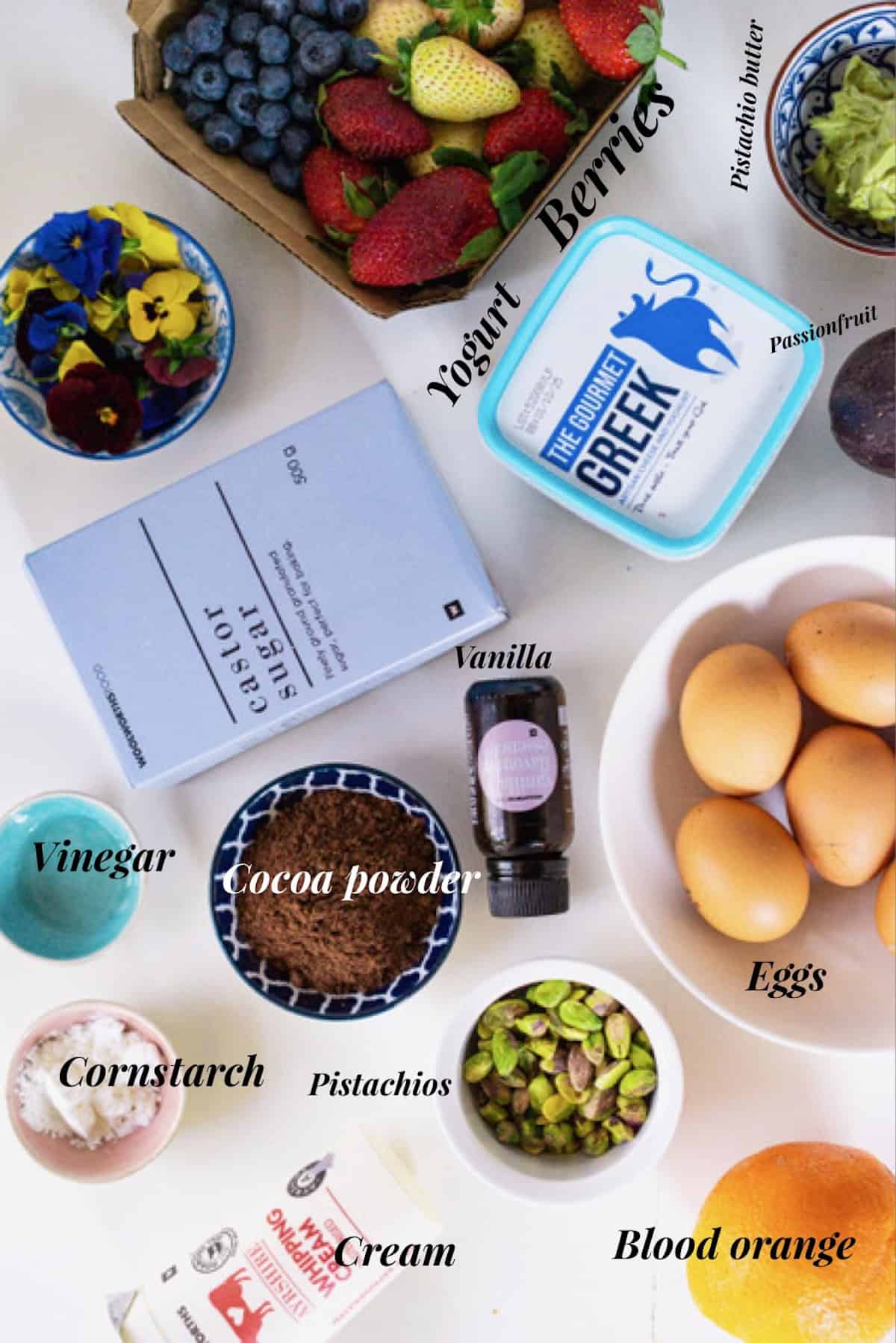
The base ingredients for a pavlova remain the same, but the toppings tend to vary from batch to batch. For this chocolate and berry pavlova, these are some of our key ingredients:
- Egg whites: for the fluffiest meringues you're going to want to use the freshest eggs. I also find egg whites at room temperature whip up easier than chilled eggs.
- White wine vinegar: adding the white wine vinegar helps with stability and texture. You should avoid using balsamic vinegar in a pavlova, as it can affect both the flavor and color.
- Cornstarch: Cornstarch if you're in the US and cornflour if you're outside.
- Greek yogurt: it's important to use a very thick yogurt or it will thin out the cream filling. I like to use the Gourmet Greek yogurt as it is high in protein and the perfect consistency for this pistachio pavlova.
- Sugar: the sugar ratio is important to make the perfect pavlova. If you don't add enough sugar, it'll be soft and spongy, but just the right amount creates a crispy, light and airy dessert you'll want to make again.
See recipe card for quantities.
Instructions
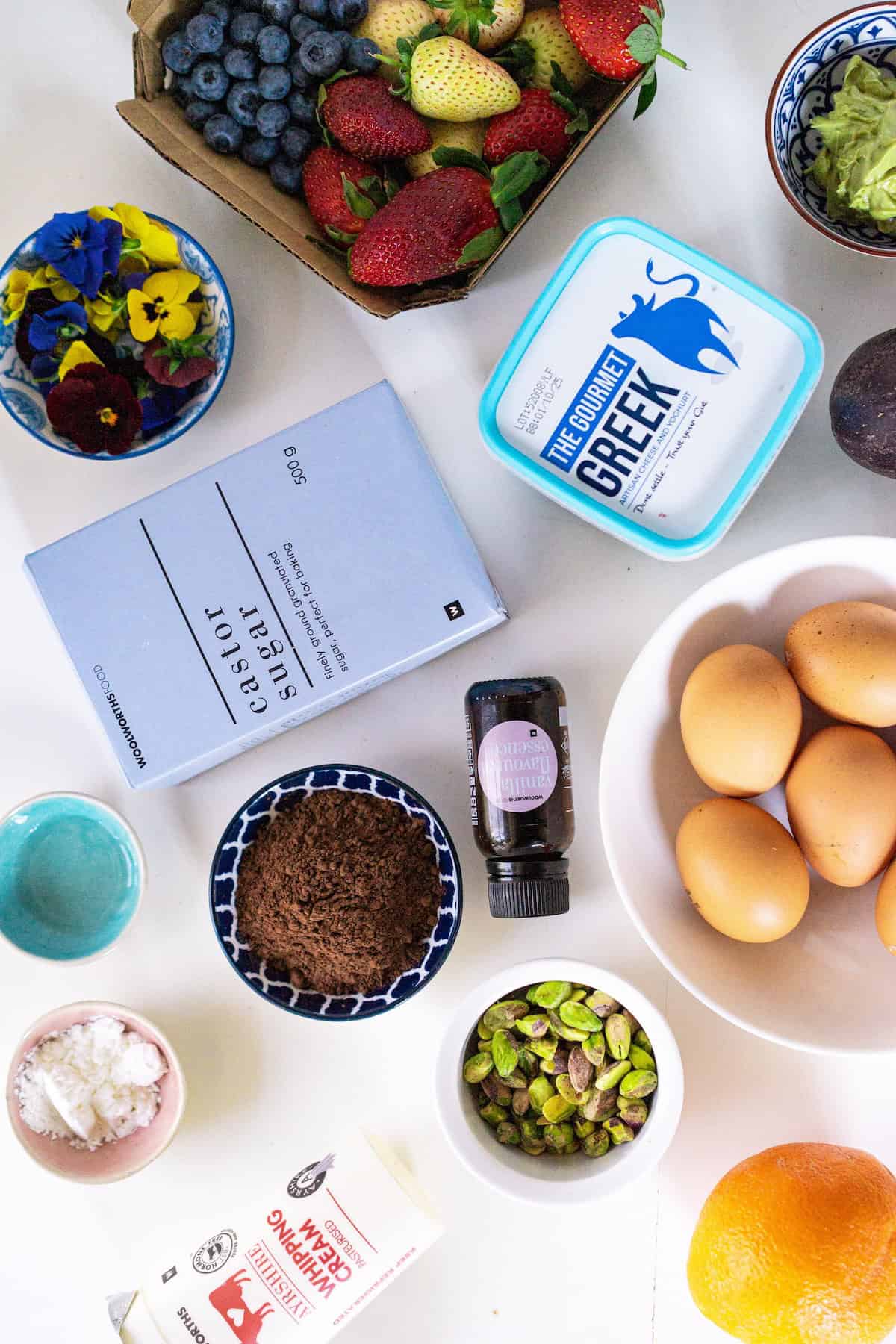
1. Gather your ingredients. Preheat your oven to 350°F (180°C). Line a baking sheet.
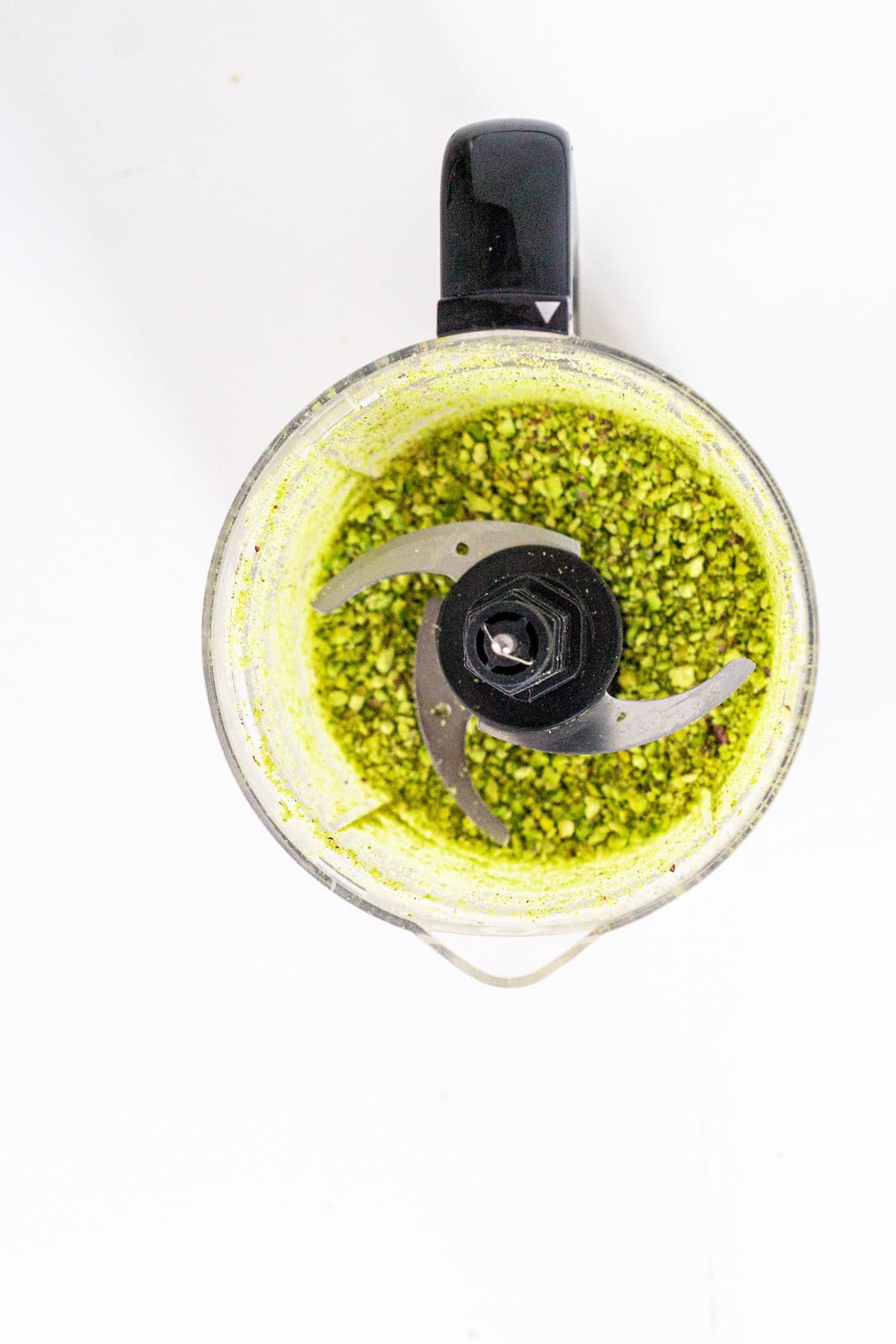
2. Blitz the pistachio nuts until fine for this pistachio pavlova.
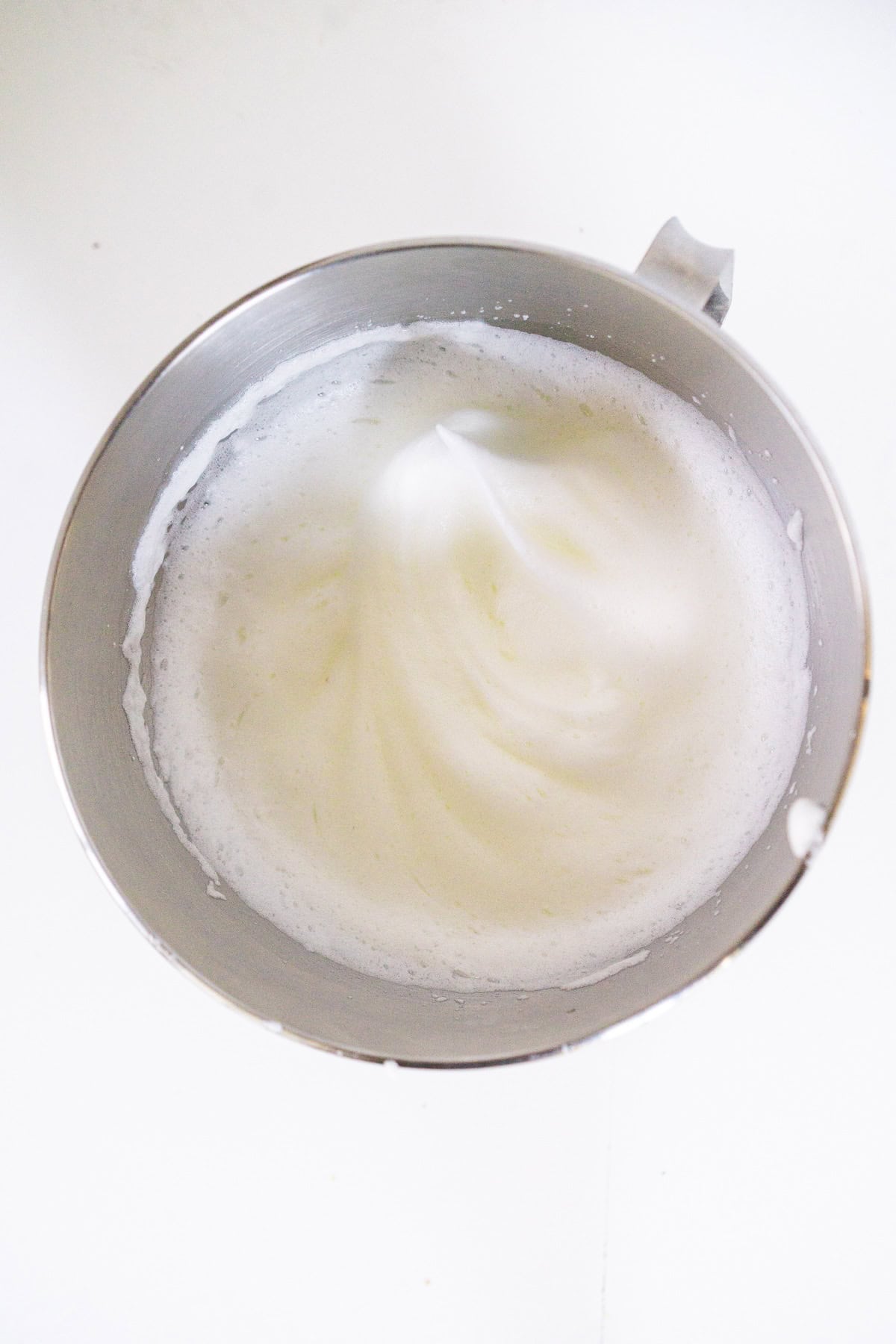
3. Separate the eggs, whip the egg whites until a stiff peak forms.
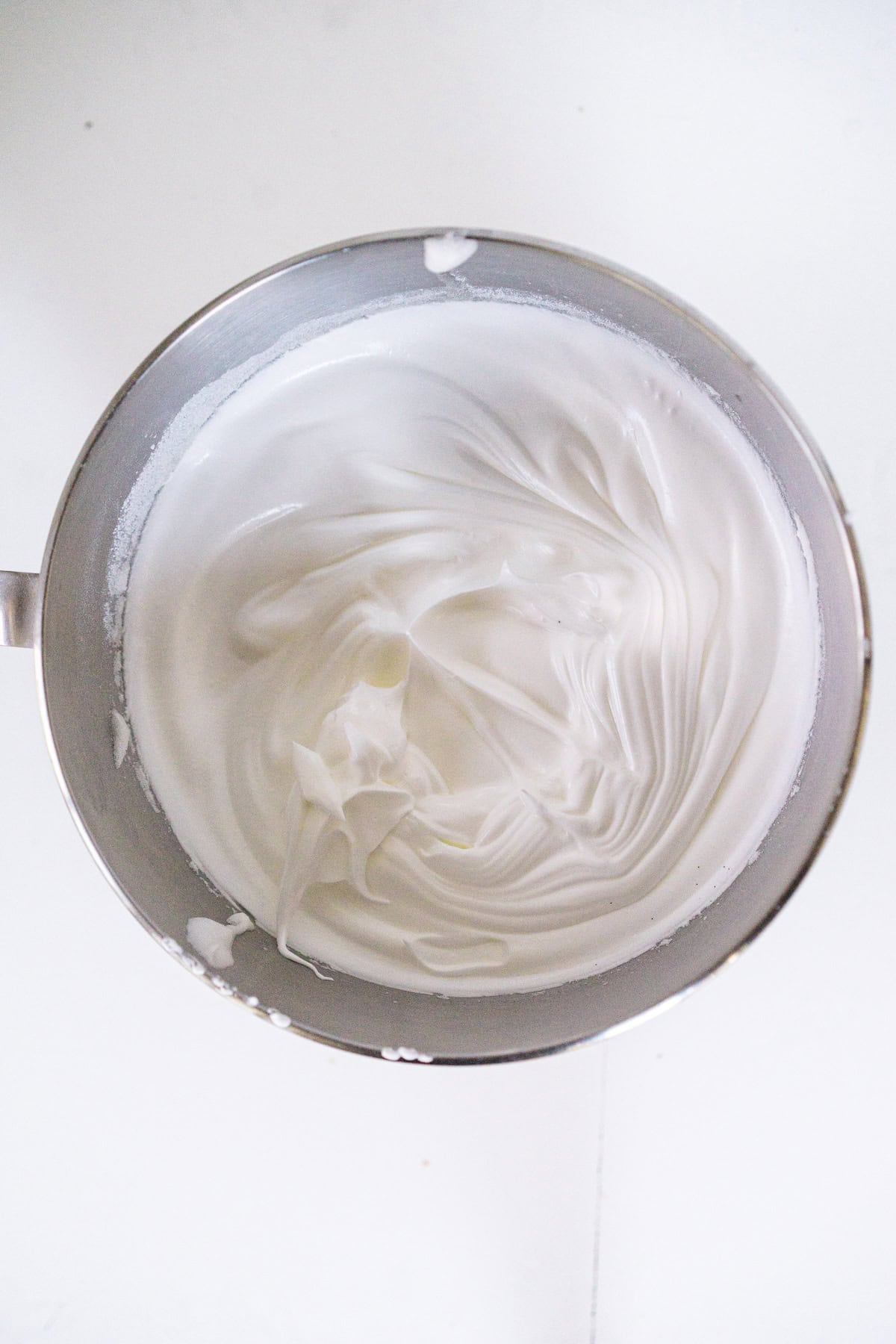
4. Add sugar, 1 TBS at a time, beating a few minutes before adding the next. Keep whipping until they're thick and glossy.
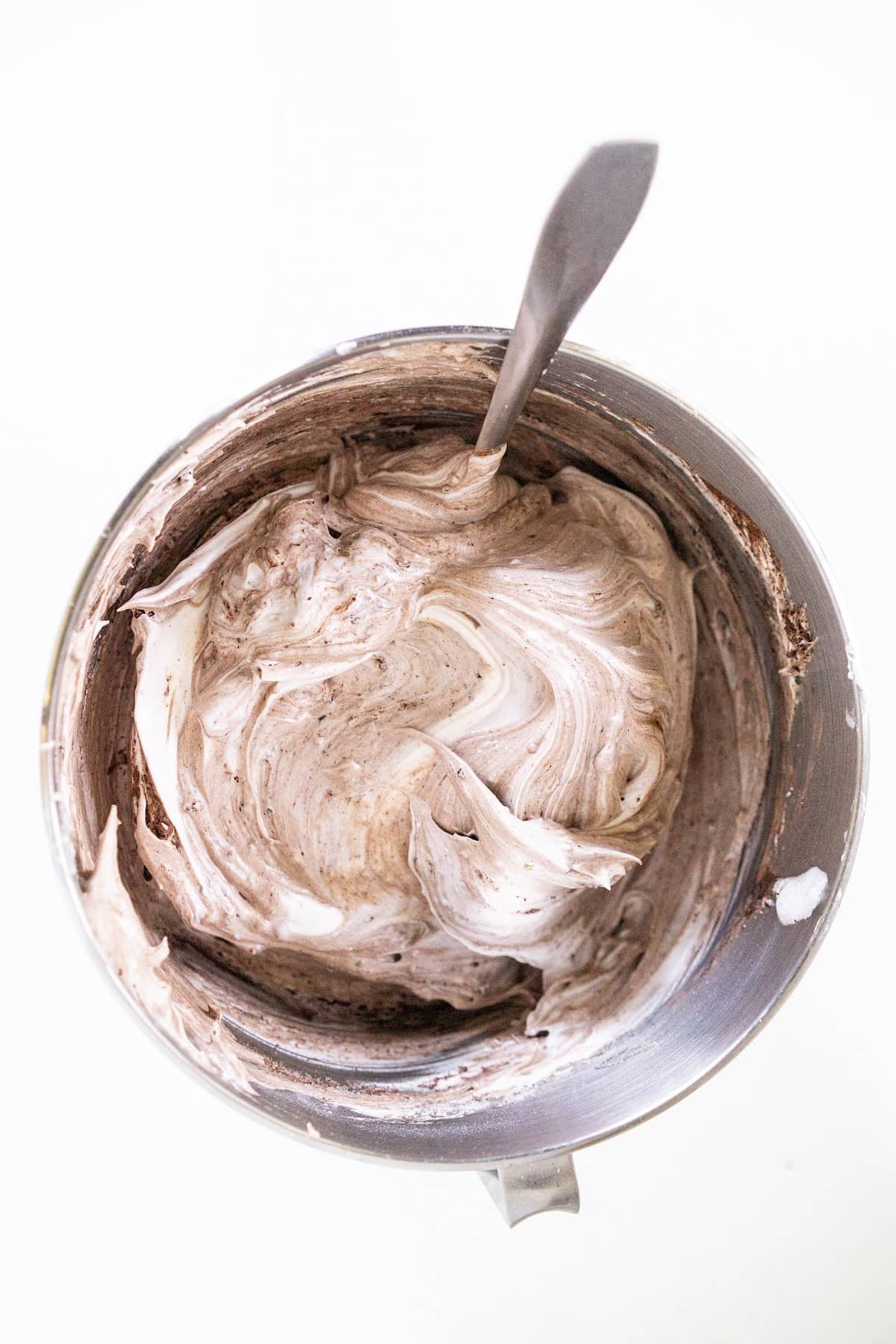
Fold in cocoa, cornstarch, vinegar and nuts. Use a metal spoon and don't over beat it.
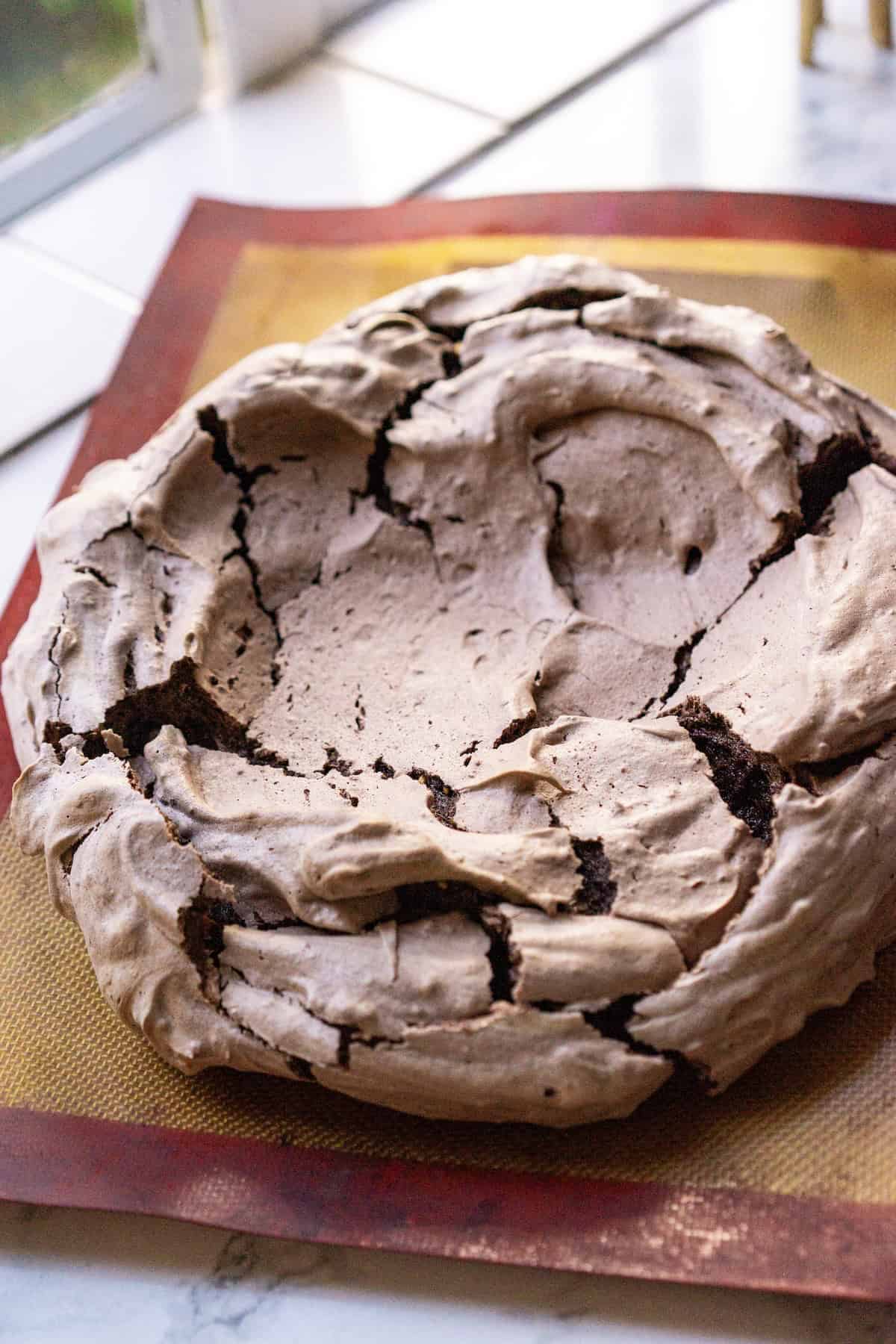
6. Gently pour the mixture onto a lined baking tray, partially hollowing out the center. Bake for 5 minutes, lower the temperature to 250°F / 120°C and bake for 1 hour 15 minutes. Cool completely before transferring to your serving plate.
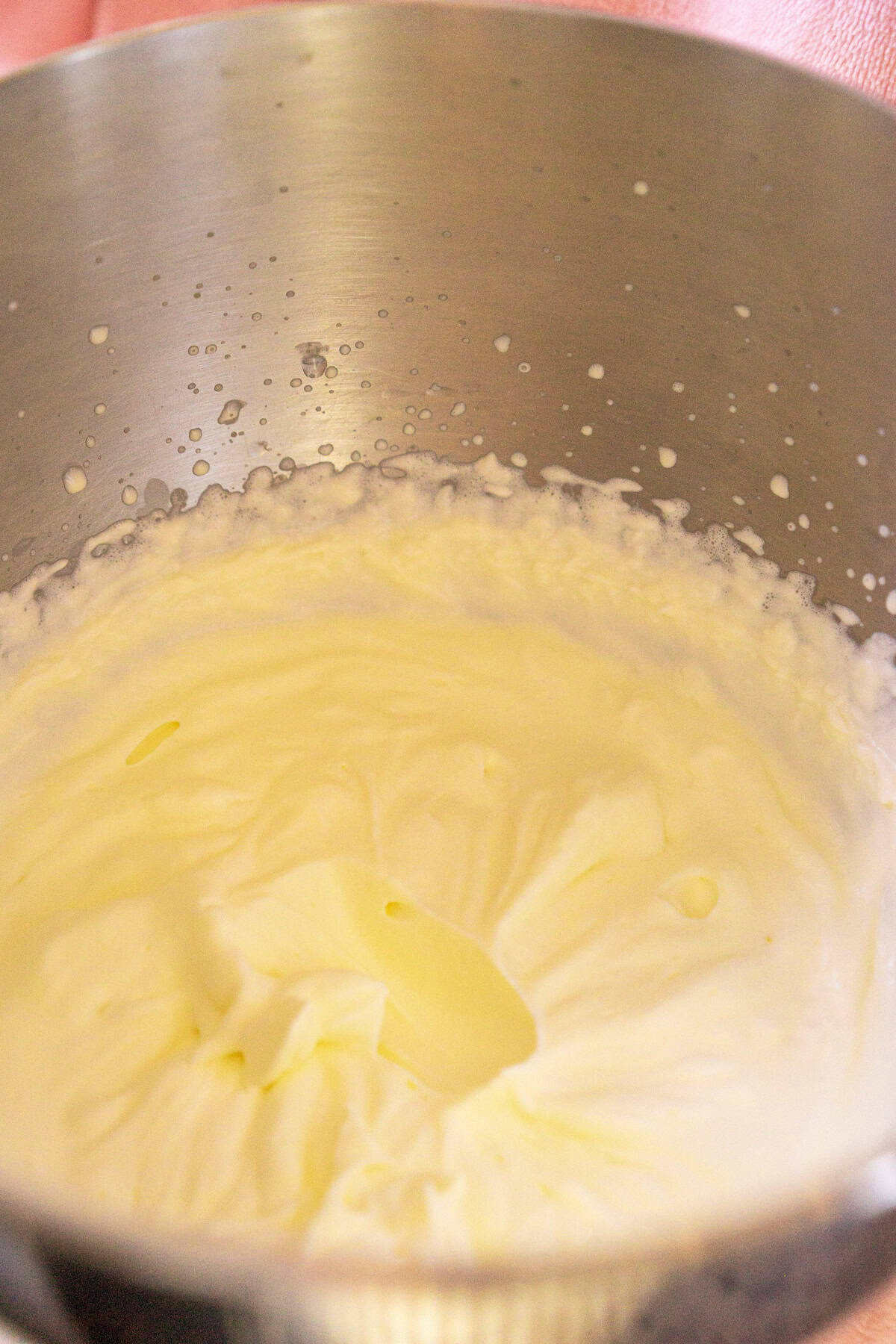
7. Whip the cream until stiff peaks form and fold in the yogurt.
Add all your toppings and you're ready to serve your fresh berry pavlova!
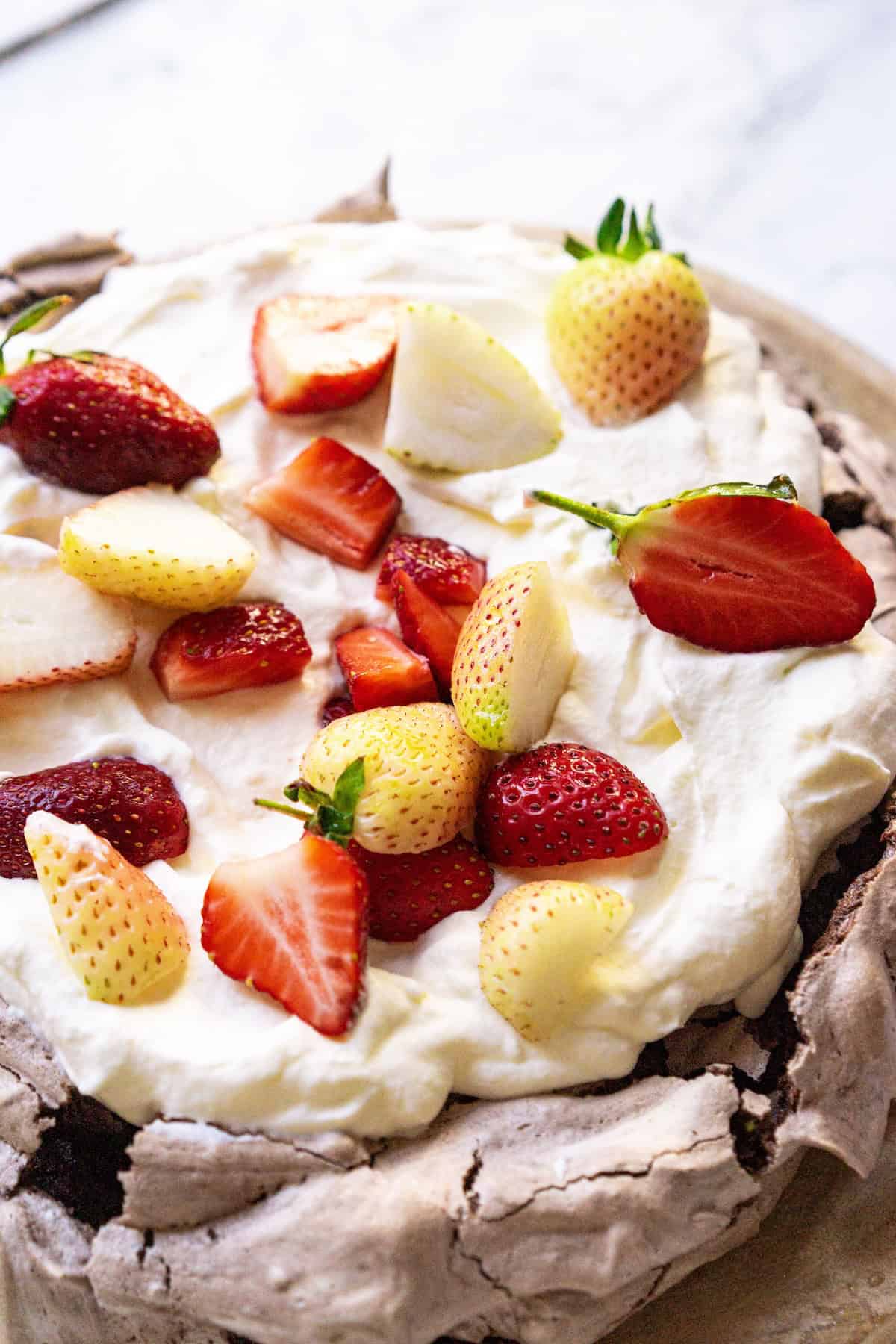
Hint: It's important to get the egg whites to a stiff peak before adding the first tablespoon of caster sugar. Make sure that you can hold the bowl upside down without the mix falling out.
Substitutions And Variations
While there aren't really substitutions for a pavlova base, the toppings invite you into a world of never-ending creative possibilities.
- Seasonal: use the fruit of the seasons to change it up. Make a Halloween pavlova with red and black berries, red or black berry coulis/sauce and blood orange.
- Vanilla: you can make this without the cocoa powder for a plain, yet divine, vanilla version of this pavlova meringue.
- Citrus twist: add some orange, lemon and/or lime zest to your mix and serve with a lemon or orange curd drizzled over it for a citrus pavlova. Top with zest and a touch of finely grated ginger.
- Festive: top your easy berry pavlova with cherries, pomegranate and kiwi for a festive pavlova and sprinkle it with cinnamon and just a touch of nutmeg.
- Eton mess: if your berry pavlova doesn't hold its shape for any reason, or ends up accidentally dropped or crushed, you can always turn it into an Eton mess. Simply layer your broken up pistachio pavlova with your cream and fresh fruit toppings for another version of this showstopper dessert.
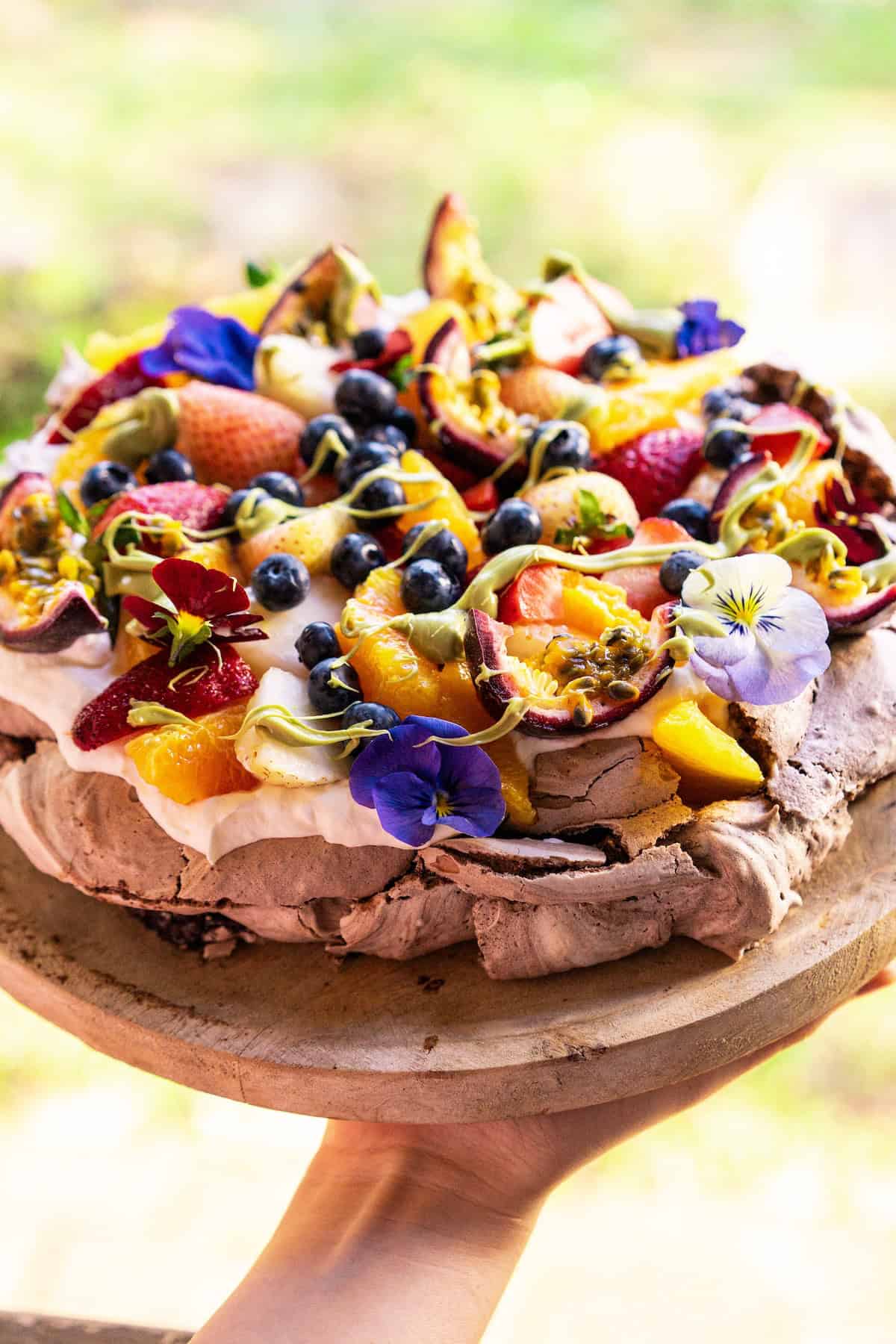
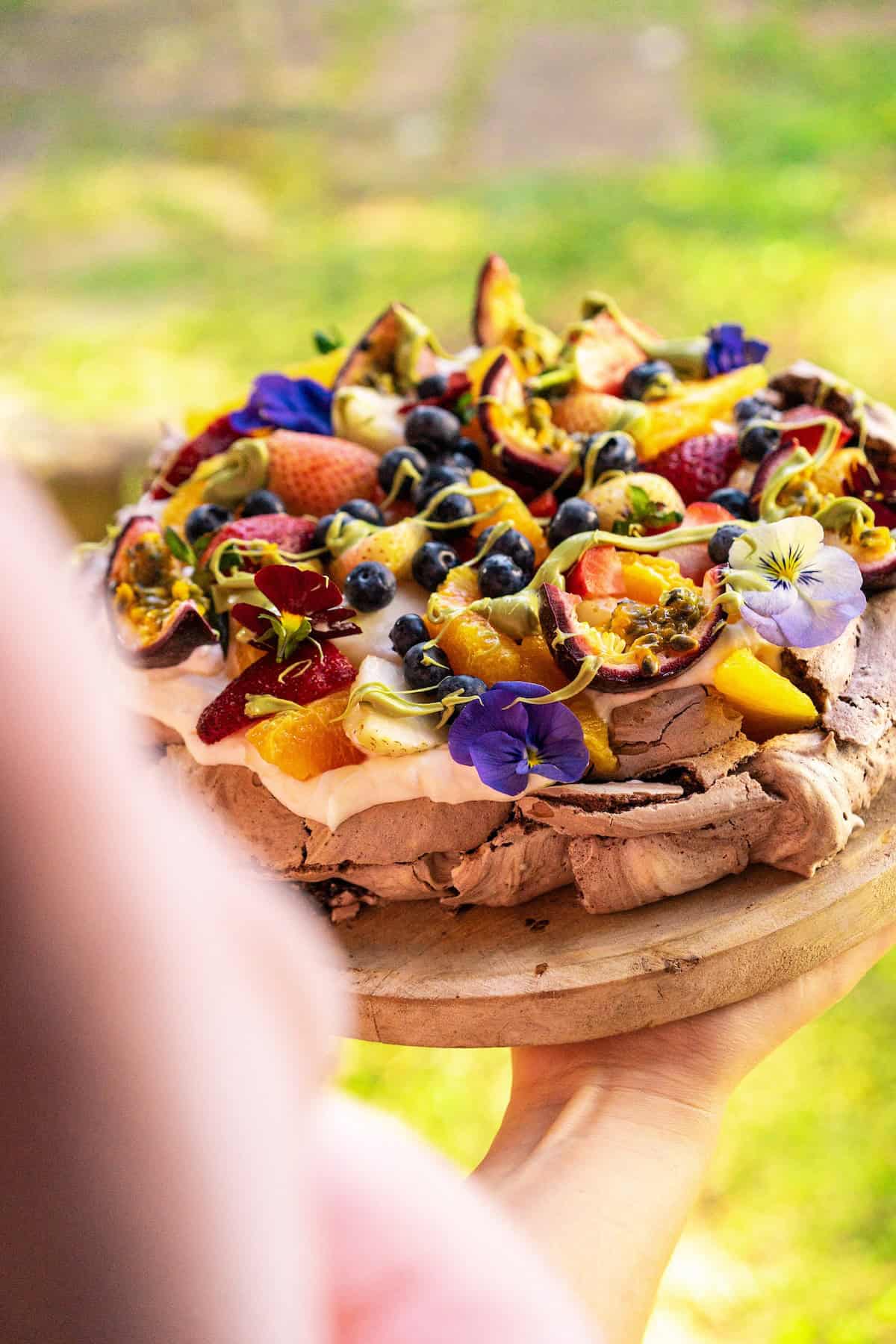
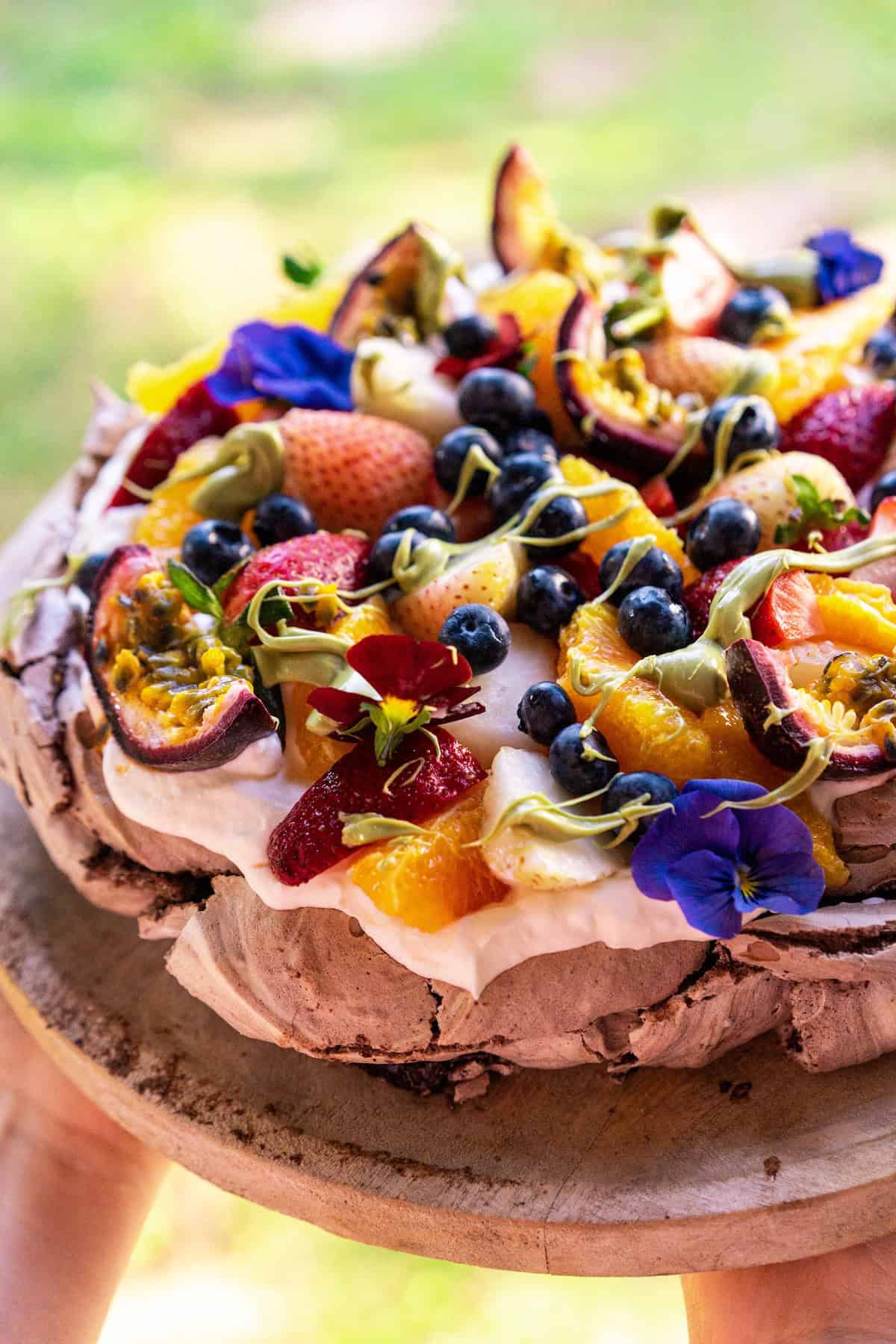
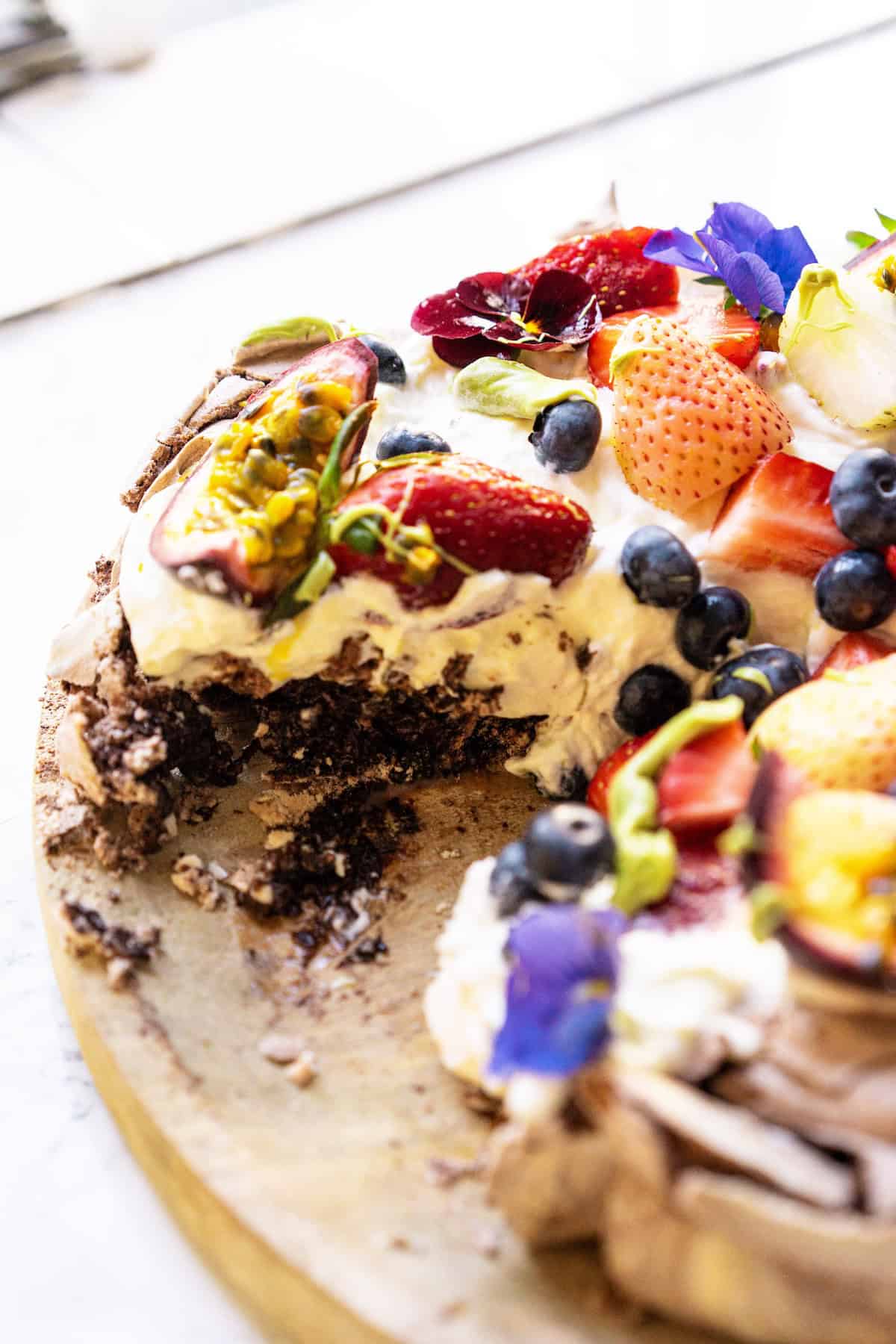
Equipment
To make a berry pavlova, you will need a stand mixer, a blender or food processor and a lined baking tray.
Storage
A berry pavlova works well as a make ahead dessert. You can make your pavlova base and once completely cooled, store it in an airtight container for 1 or 2 days. If you live in a humid environment, be extra careful to store your pistachio pavlova in a cool, dark, dry place.
Once the topping is added, it's best to serve within 6 hours, BUT you can prepare your whipped cream topping and fresh fruits in advance. Assembling your beautiful pistachio pavlova won't take more than a few minutes.
If you somehow magically have leftovers of this pistachio pavlova, they can be stored in the fridge for a day or so, but they will start to melt and the consistency will not remain the same.
Note: This recipe cannot be frozen.
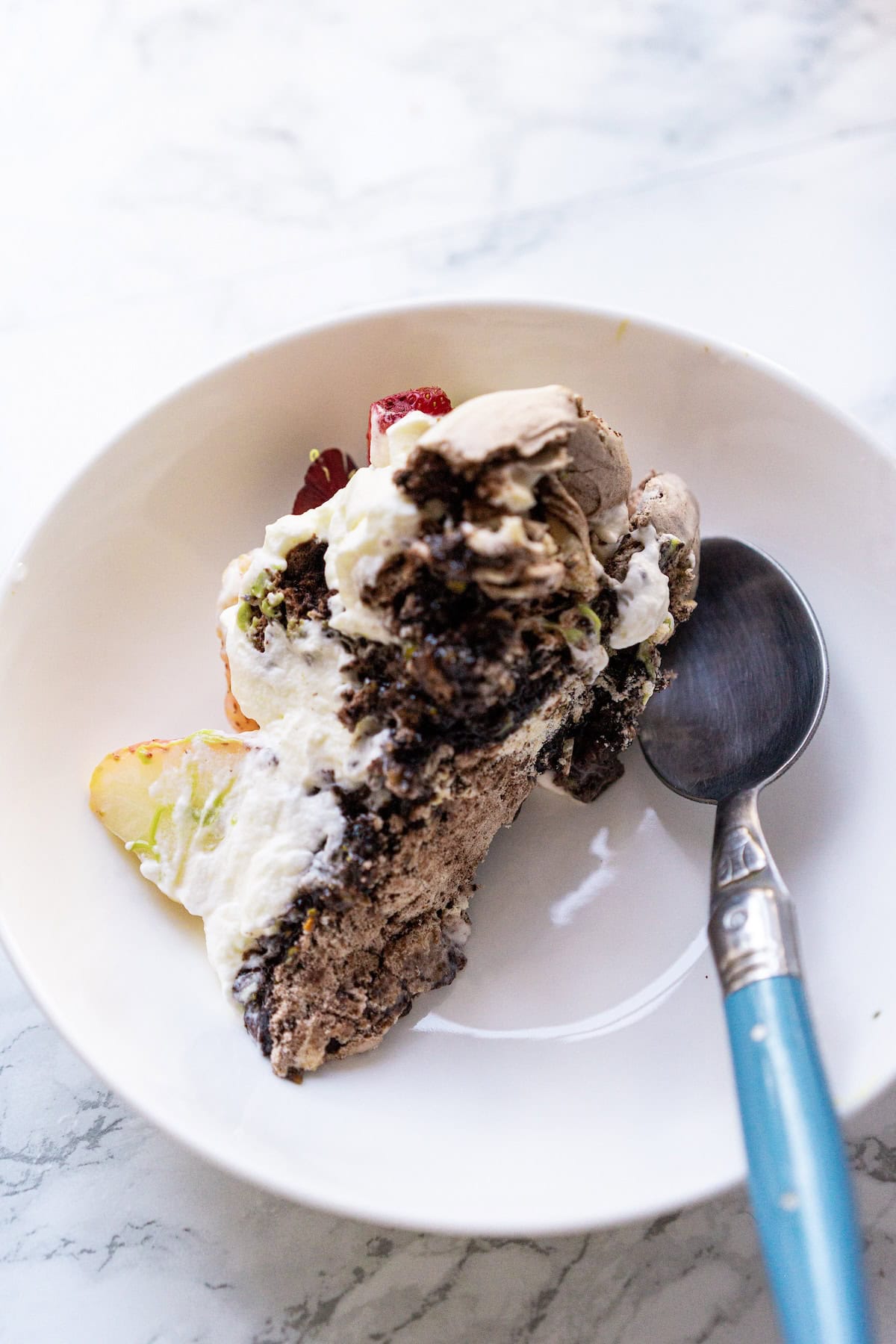
Top Tip
- The pavlova "grows" to roughly double its size in the oven, so make sure you have enough space on the tray for expansion.
- Make sure to sieve the cocoa powder and cornstarch (UK cornflour) before adding it to your mix.
- Always use a metal spoon, not plastic or wooden, when working with a whipped egg mixture like meringue. It “cuts” through the mixture cleanly.
- Chilling the bowl before whipping helps to stabilize the cream.
- If your eggs aren't at room temperature, you can add them to warm water for 15 minutes.
- On a humid day, try to bake your pavlova early in the day. That way it can stay cooling in the oven during the hottest times and be crisp and fresh when you're ready to serve.
FAQ
You can use a handheld mixer, but it will take longer to aerate the eggs, so if you have a stand mixer available, I'd use that.
No, the pavlova mixture needs to be placed in the oven as soon as possible.
The center can sometimes collapse if there has been a drastic change in temperature or if the eggs were overbeaten.
Related
Looking for other recipes like this? Try these:
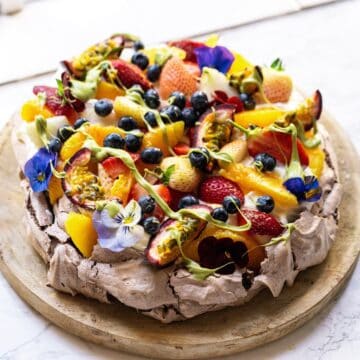
Chocolate And Berry Pavlova (Easy)
Ingredients
For the pavlova:
- 6 eggs
- 1 ½ cup caster sugar
- 2 teaspoon cornstarch
- 4 TBS unsweetened cocoa powder
- 1 teaspoon white wine vinegar
- 1 teaspoon vanilla
- ¾ cup shelled pistachios
Cream topping/filling:
- 1 cup whipping cream
- 1 cup thick Greek yogurt
- ½ teaspoon vanilla
For the toppings:
- Berries: strawberries and blueberries
- Passionfruit
- Blood Orange
- Unsweetened pistachio nut butter
- Edible flowers
Instructions
- Heat oven to 350°F/180°C. Line a baking sheet with baking paper or a baking mat.
- Blitz the pistachio nuts to a fine texture.
- Separate egg whites from yolks. Whip the egg white until it forms a stiff peak.
- Add 1 tablespoon at a time of sugar and beat for a few minutes before adding the next. Whip until thick and glossy.
- Gently fold in cocoa powder, cornstarch, vinegar and nuts. Don't overbeat but rather fold in gently with a metal spoon.
- Add the mixture to the center of the lined baking tray and create a hollowed out shape.
- Bake for 5 minutes. Turn the oven down after 5 minutes to 250°F/120°C and bake for 1 hour 15 minutes.
- Cool completely and very carefully transfer to a plate. If you are nervous to transfer it, just serve it on the baking paper.
- Whip up the cream until stiff and fold through the yogurt.
- Top with all your bits and serve in the middle of the table for some DRAMA!

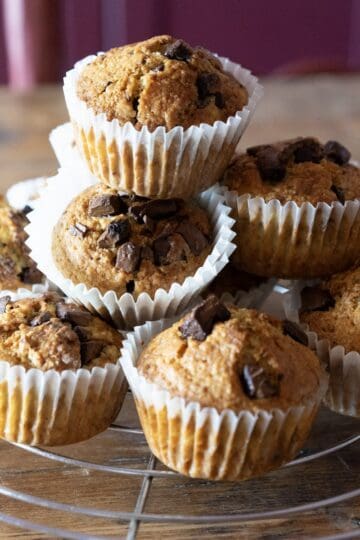
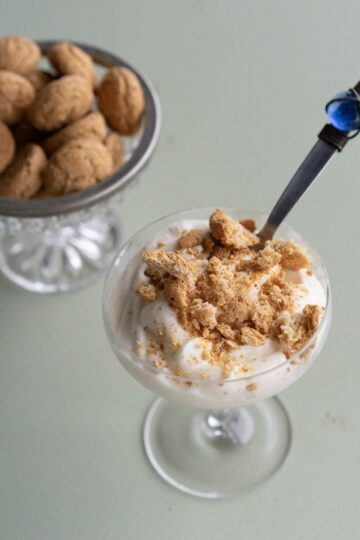
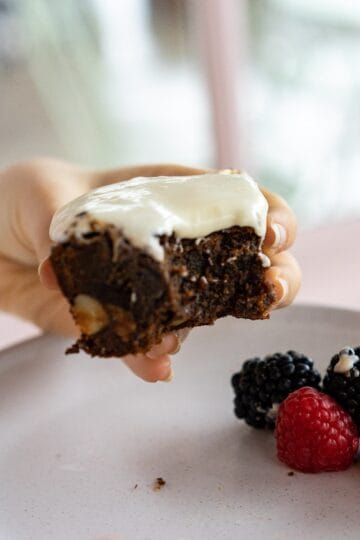
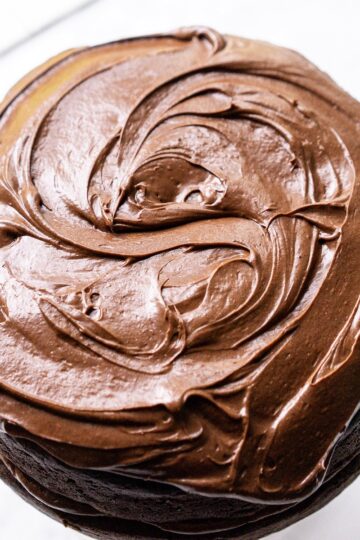
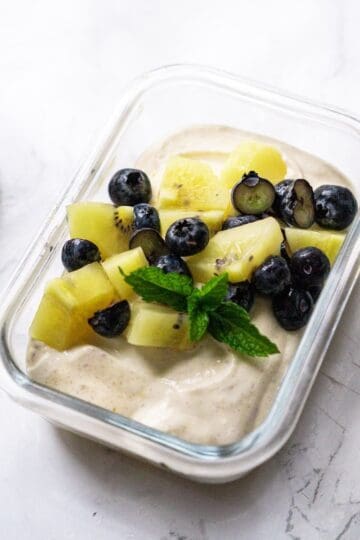
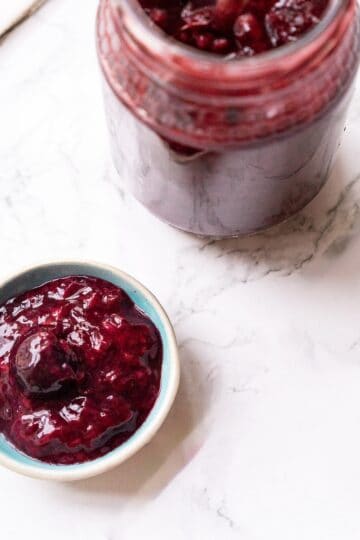
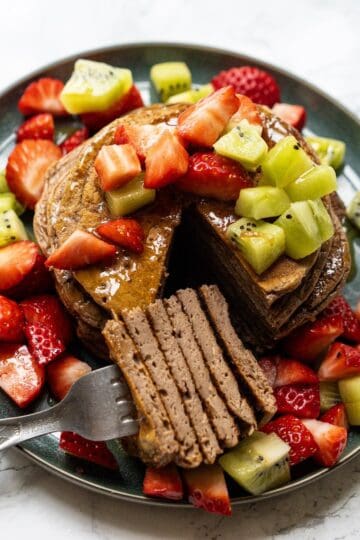
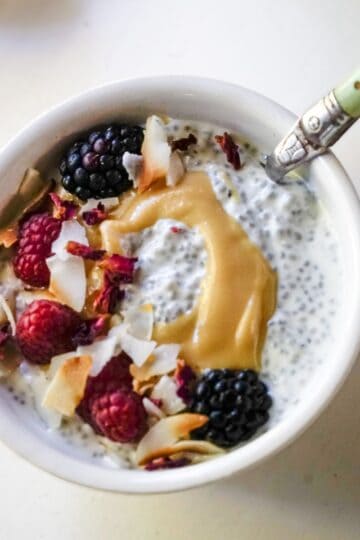
Kimmi Coffee says
Can't wait to try this recipe, pavlova has been on my to-bake list for way too long. It always seemed complicated but this is so simple to follow. I'm thinking a fruity, creamy Christmas wreath it happening this December...
casey says
Make is with seasonal fruits for a more autumnal feel!